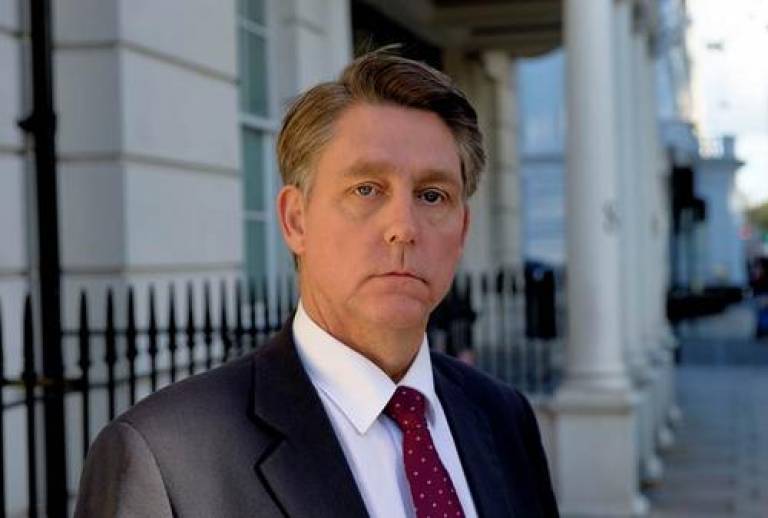Combatting Modern Slavery
2 March 2017
Hanna-Johara Dokal (MSc Global Governance and Ethics) on the GGI keynote lecture with Kevin Hyland, OBE, the UK's first Anti-Slavery Commissioner.

Kevin Hyland, OBE is the first Anti-Slavery Commissioner in the United Kingdom. At a recent Global Governance Institute (GGI) keynote lecture, he discussed the 2015 Modern Slavery Act, offering poignant insight into the current slave trade - a complex and deeply entrenched aspect of our globalised society. The first ever national legislation of its kind, the Modern Slavery Act consolidates and simplifies existing legislation in order to target perpetrators, as well as enhance support and protection for victims of modern slavery.
Hyland first addressed the proliferation of modern slavery, which can be viewed as a by-product of globalisation. The mass production of goods intended for numerous markets across the globe has forced some of those most desperate for basic utilities into slave labour. The well-documented working conditions in garment manufacturing gives insight into only one aspect of a reality lived by many. Often, perpetrators implement contracts and conditions that prevent workers from escaping, coercing around-the-clock labour for the entire year. Such practices are hard to identify as supply chains are extensive, making it difficult to monitor where goods are coming from and where modern slavery occurs.
Therefore, Hyland discussed the need for transparent supply chains and what tools should be provided to businesses to set up effective transparency procedures. Currently, advisors and consultants are employed to assess the structures of large companies that source from the 'Third World'. However, too often, these assessments adopt a shallow exercise of 'box-ticking', as Hyland described it, overlooking vital aspects of supply chains, such as the actual workers involved. Now, through the Modern Slavery Act, businesses will be obligated to implement more detailed audits regarding procurement, quality control and approved sources.
One of the key goals of the Act is to alter cultural perceptions, in the hope of making sustainable changes in consumer and business behaviour. If consumers want to know more about the origin of their products and strive to purchase slavery-free items only, businesses will have to yield to this shift. Once large businesses that are punishable under the Modern Slavery Act feel compelled to tackle modern slavery, this will also put pressure on smaller businesses and social enterprises who do not fall under the commercial business category monitored by the Modern Slavery Act. Because larger companies can influence businesses and suppliers all the way down their supply chain, they carry a lot of responsibility in tackling the slave trade. Hyland promotes a culture of information sharing, emphasising that by sharing information on ethical suppliers with other businesses, large companies will be noted as being socially and corporately responsible and will gain more business, rather than losing out. However, the processes of how supply chain auditing and reporting will actually work on the ground have not yet been designed in detail.
Hyland also stressed that there would not be a financial restriction or strain on companies if they were to increase wages for workers in least developed countries. Raising the wages of workers by as little as fifty pence will not impact the prices of the product produced but greatly benefit the workers. This needs to be emphasised as a retort to the current rhetoric used by businesses as they attempt to avoid changes to supply chains.
In fact, global economies are currently suffering as a consequence of dealing with the modern slavery in an incoherent manner. Incidences of slavery are dealt with as isolated cases rather than being linked to the trade as a whole. This approach means high costs for governments organising victim support whilst simultaneously not tackling the large groups of perpetrators, allowing the latter to make up to £150 billion per year.
In his talk, Hyland expressed deep empathy for the victims of modern slavery. Reflecting on a visit to Nigeria, he recalled a moving encounter he had with a female leprosy sufferer in a rural town in Endo State. She spoke with him about the huge improvements non-state hospitals established by charities had brought to her home town. She was thankful the younger generation would avoid the same suffering she endured with her illness, but then questioned what is being done about the new plague affecting the youth in her town: modern slavery. She asked: "If you can help with medicine, why not with this?" Hyland expressed his admiration for people like this woman who have endured unimaginable hardship and still have not lost hope. Encounters such as this one are a personal motivation for him to promote the implementation of the Modern Slavery Act - which he believes is a necessary step in addressing the "evil" that is modern slavery. Otherwise it will only continue to infiltrate numerous industries and destroy the lives of those already embroiled in poverty.
It is difficult to comprehend the lack of legislation thus far on the longstanding issue of modern slavery, making the work carried out by Hyland all the more pertinent and critical. The intentions of the Modern Slavery Act are no doubt noble. However, within Hyland's talk and within the Act itself, the obscurity surrounding the actual tools to identify and regulate modern slavery remains a crucial area in need of improvement. One year after the Act has been established, barrister Caroline Haughey provided an independent review of the efficacy of the Modern Slavery Act. She concluded that although it has set an international benchmark, there is a need for greater consistency in how law enforcement and criminal justice agencies deal with the victims and perpetrators of modern slavery. "Better training, better intelligence and a more structured approach to identifying, investigating, prosecuting and preventing slavery" is also required for the modern slave trade to truly be derailed.
 Close
Close


